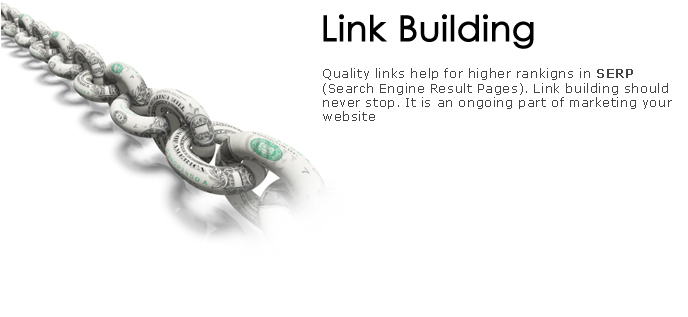If you are looking to build links for your website then there are many sites who sell links and many offers them for free, just you need is to exchange the links with them. To pursue links you should prefer quality over quantity.
I put down some of the guidelines that we follow when formative the value of a link – whether to buy it, has a request for it or to write content to earn it, etc.
1. Anchor Text
Targeted anchor text can have a very powerful effect. For example, Company A is trying to rank for a search term as “X Services”, it would be helpful to have a incoming link form trusted websites using the search term “X Services”. An optimized anchor text link is more valuable than a generic link such as “X Company” or especially an URL-only anchor text such as “http://www.Xcompany.com”.
Google take notice of sites, whose links consist almost entirely of similar anchor text, especially I that text matches the page title and H1 tag of the site, but is not found in the domain name. It’s always a productive idea to change the anchor text with which sites link to you and to have plenty of links whose anchor text is your official site name.
2. Image Links vs. Text Links
Text links are more valuable and given more trust and weight comparing image links. Use ALT tag with your optimized keywords relevant to that particular image or with your site’s name.
3. Top-Level Extension
Links form .gov and .edu domains are more trusted and worth more than links form .coms, .nets, and .orgs. Many webmasters and SEOs believe that links form .infor, .ws and other less popular extensions have less worth than .com, .net and .org links. However getting a link form .gov sites are the most highly valued and significant, and can help in improving site’s TrustRank.
4. Who links to the page?
Let’s call the page you’re pursuing a link on Page A. PageRank and TrustRank, two of Google’s most prominent algorithms, both look at who links to Page A when determining how much benefit your site will receive by having a link there.
If a page has a large number of inbound links, it will transfer more authority to your site than a page that has little or no inbound links. Another important factor is the quality and type of links the page has. SEO For Firefox is an excellent tool to help determine some of these factors. Once installed, it allows you to select “Lookup This Page” from the right-click/context menu and see a number of indicators of how popular or authoritative the page you are viewing is.
Yahoo’s backlink tool provides much more public data than Google’s, and shows the number and URL of sites that link to a particular page. You can query Yahoo for things like ‘link:http://www.site.com’ to view a list of indexed pages that have linked to a particular URL (also try link:http://site.com to get different results).
Check out a few of the pages. Do they appear to be spam or low quality? Do they have little or no inbound links? Any popular or large site will have a lot of links, and some of them will be spam or scraper sites. However, if upon investigation it appears that sites like this comprise most of a site’s link profile, it isn’t a good sign.
5. Who else does the page link out to?
If a site is linking to a lot of poor quality and low value sites, it’s usually best not to seek a link from them. Even though the site may have a decent visible PageRank, their TrustRank score is probably going to be very low, and that will affect the ultimate value of the link.
One of the purposes of TrustRank is to flag sites with high PageRank that have very few or no trusted inbound and outbound links. Sites flagged for this have typically gained PR by garnering hundreds or thousands of links from low quality and spam pages.
On the other hand, if a site is linking almost exclusively to well established or high quality sites in your field, you want to be listed there without exception, unless it is cost prohibitive.
6. Google PageRank
The “visible”, or “toolbar”, PageRank of a site is something to consider, though a high-PR link is not automatically “good”. There are factors than can dampen a site’s PageRank and prevent it from being passed.
If a site is very obviously selling links (and using language such as Sponsors, Advertisers, Paid Listings, etc. to denote those links), it’s possible that Google no longer allows it to pass PageRank. Keep that in mind before you get out your wallet.
7. Last Crawl Date/Index Check
Thanks to Aaron Wall for this useful link value metric that I use almost frequently.
Don’t expend time or money to gain a link on a page that is not indexed. Obviously, if a search engine doesn’t even care enough about a page to index it, it won’t find your link there, and if it did, it wouldn’t be worth much anyway. You can check any search engine to see if a page is indexed by entering:
cache:url
Try entering the URL both with and without the www prefix if it does not show up with one or the other.
You can use this to see if the page is indexed, and the last time it was crawled. Though you will not always get the most accurate crawl date, it’s still good to check. A good guideline to follow is that if the date shown is more than 45 days old, the page is not very trusted and a link there won’t carry a lot of weight. Probably the only exception to this guideline is if the page is on a highly trusted domain like business.com, dmoz.org, botw.org, dir.yahoo.com, or some other popular site that is viewed as an authority or resource within your niche.
This isn’t a hard and fast rule - for instance, new sites may not have been fully crawled yet - but in most cases, the last shown crawl date is worth paying serious attention to.
8. Domain Authority
Some domains are very established and trusted, and a link there carries weight regardless of other factors like PageRank. Some of the domains mentioned in #7 are good examples.
There are two ways to estimate a domain’s general trust and authority. If you see things like forum posts or untargeted inner pages from that domain competing with homepages of related sites in rankings, you can assume that search engines are showing that domain favor.
You can also view all the inbound links to a domain to determine if it is listed in popular/trusted directories, authority sites, media outlets, etc. Chances are, if a domain has a high number of quality inbound links, a link there will benefit you, despite any other factors (as long as the page is indexed).
Links on obscure pages of high authority domains may not do much for your PageRank, but will definitely improve your TrustRank.
A domain’s age is another important factor. The longer a domain has retained the same WHOIS information and been indexed by search engines, the more trust it is given. You can check a domain’s WHOIS/registration info at sites like domaintools.com, while archive.org can often show you the history of a domain’s content.
9. Is this site part of the active web?
Google’s algorithm is changing to incorporate the ‘active web’ such as Digg and social bookmarking sites. Forums, blogs, and social sites where communities frequently introduce and rate sites and content is a good link resource, and it pays to have a presence in sites like Digg, StumbleUpon, del.icio.us, forums within niche authority sites, etc. None of these links are worth a lot individually, but they can begin to add up.
Web 2.0/bookmarking/networking sites are also the gateway to more natural links. A forum signature or Digg submission may lead a blogger to your site. If he likes it, he may write about it. By spreading content to the active Web, a lot of content writers gain links they never even asked for.
10. If the site sells links, it is obvious?
I mentioned this in #6, but it’s worth elaborating on. Google has become very focused on stripping the ability to pass PageRank and influence rankings from sites that are selling links.
Don’t expect much of a ranking increase from pages that openly advertise that links are for sale, have links that appear “over-optimized” and out of place, have text such as “Your Link Here” or “Sponsored Links”, etc. If the site appears spammy but you want a link there for direct marketing purposes, ask them to tag your link with rel=”nofollow”, so search engines are assured that you didn’t purchase a spam link to try to manipulate rankings.
11. Is the link nofollowed, or does it use redirects?
Many links are implemented with redirect code so the site can track how many visits they are sending you. Search engines often have trouble with the redirect and do not end up crediting you with the link. Examine the site’s source code and see if they are adding extraneous code into the ‘href’ portion of the link tag. If they are, tell them you want a clean link.
You can test to see if search engines can handle the redirect by looking at the link profiles of sites being linked to from the page. If the page shows up in their Yahoo link profile, you should be fine.
Also be sure that there is not a rel=”nofollow” tag on the link. If there is, it will carry no authority over to your site. Also check for the meta “nofollow” tag in the headers of the page’s source code. This code tells search engines not to follow any of the links appearing on the page.
12. How relevant is the site to mine?
As search engine algorithms have evolved, one increasingly important factor in a link’s effectiveness is how relevant the page that links to you is to your site’s content. An irrelevant page is obviously worth less as a link than a relevant one.
Also take note of how strong the on-page optimization is. Two pages may be related to Product X, which you sell. One may have a page title of “Welcome”, while the other may have an optimized page title like “Product X Information”. Even though both pages are relevant to your site, the latter, optimized page will be a stronger link.
13. Does the site openly require a reciprocal link?
Obviously, search engines don’t quite care for reciprocal link exchanges. A site should at least require this privately, when someone contacts them seeking a link.
That’s it for my 13 link quality metrics. In a nutshell - seek links with descriptive anchor text from sites that are:
• relevant
• internally optimized
• quality resources
• linked to from other quality, established sites
You’ll find that by following these guidelines, you may not pursue or obtain as many links, but your time (and money) will be better spent on links that will actually make a difference to your rankings.
Sunday, September 5, 2010
Subscribe to:
Post Comments (Atom)








2 comments:
Hi, good article on link building. I have an article on link building too.
Internal Links
Thanks for the info, this will help out the novice web masters who are looking for quality links. I love to join some SEO forum to get quality links. I really enjoyed this article. I have found it difficult to organically gain quality links. I must assume community interaction would help immensely! Once again thanks.
web marketing melbourne
Post a Comment
Don't try to spam.